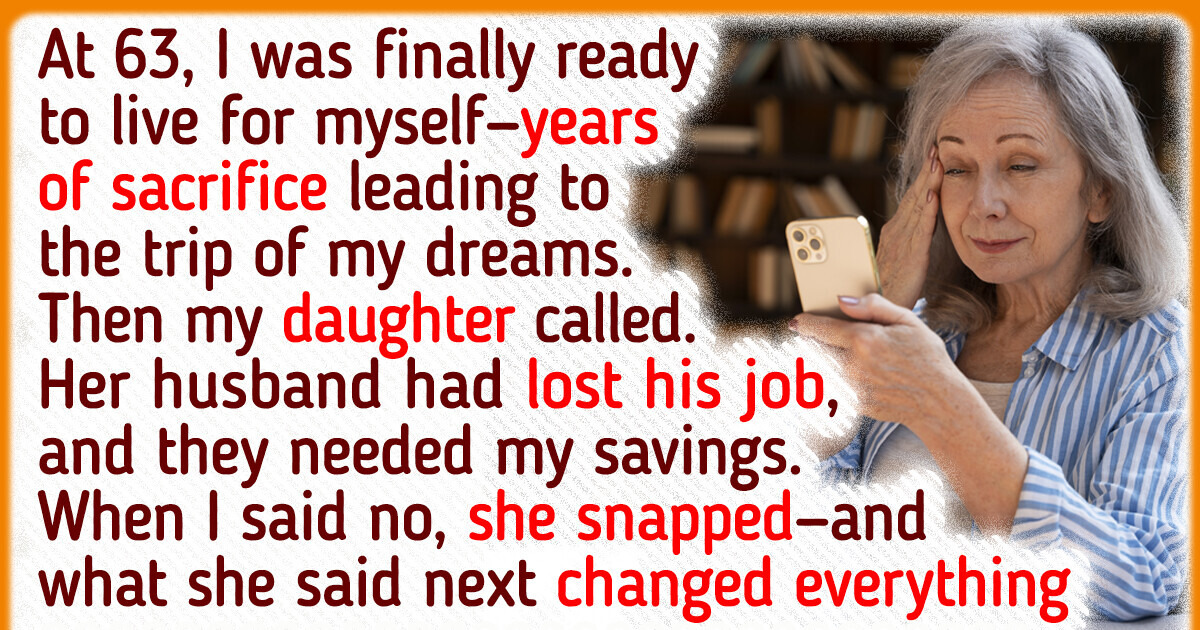I Left Our Family Gathering After My Daughter Gave Me a Heartbreaking Ultimatum


We recently received a letter from one of our readers that struck a deep chord. This mother shared her struggle with a situation involving her daughter and son-in-law. She spent her entire life putting her family first, sacrificing her own dreams to support those she loved. But now, at 63, she finally took a step toward something just for herself.
Hi Bright Side,
I’m a big fan, and I've been a longtime reader, delving into your stories and sharing my thoughts. But I guess it's time for me to share my own story too.
At 63, I finally had a chance to live for myself. After years of saving, I finally planned my first trip abroad. I’d dreamed about it for so long. But recently, I got a call from my daughter.
My son-in-law had lost his job, and they were struggling. They asked me to help with my savings. I told them I couldn't. Then she snapped and said, "If you can turn your back on me when I need you most, don’t expect me to come running back when you need something. Because I won’t." I was called selfish and terrible mother.
In the days that followed, guilt gnawed at me. Was I being selfish? Shouldn’t family come first? But I couldn’t ignore the quiet joy I felt every time I picked up my camera. For once, I was choosing me—and it felt both freeing and painful.
I’m still not sure if I did the right thing. But I’m trying to live for myself. I don't want to lose my family and my dream. What should I do?
Ruth
Thank you, Ruth, for sharing your story with us. Don’t worry—you’re not alone. We’ve prepared some guides and tips to help you navigate your situation and gain a better understanding.
While we often strive to make others happy, sometimes the healthiest way to manage expectations is by setting clear boundaries and confidently saying “no.” Whether it’s declining an event invitation, turning down extra responsibilities, or refusing a family request, overcommitting can lead to stress and resentment. Learning to say no when needed helps maintain balance and perspective.
Establishing boundaries also means recognizing when family expectations are unrealistic. Like in Ruth case, if a loved one expects you to sacrifice your hard-earned savings for their financial struggles, it’s okay to stand your ground. Prioritizing your own well-being doesn’t mean you don’t care—it simply means finding a balance between supporting others and honoring your own needs.
Having self-worth doesn’t mean being selfish or inconsiderate. You can still be caring and supportive while also setting boundaries that protect your well-being. It means recognizing when a situation is unfair and having the confidence to say no, even when it’s difficult.
In Ruth’s case, prioritizing her dream didn’t mean she didn’t love her family—it meant she understood the importance of valuing herself too. It’s okay to stand firm when someone’s expectations are unreasonable, and it’s perfectly valid to say, "My needs matter too," without guilt. In fact, it’s essential.
Thank you again for reaching out to us, Ruth. We’re sure your story will resonate with many others and offer valuable insight. Before you go, be sure to check out another compelling read about a family's dinner conflict.











